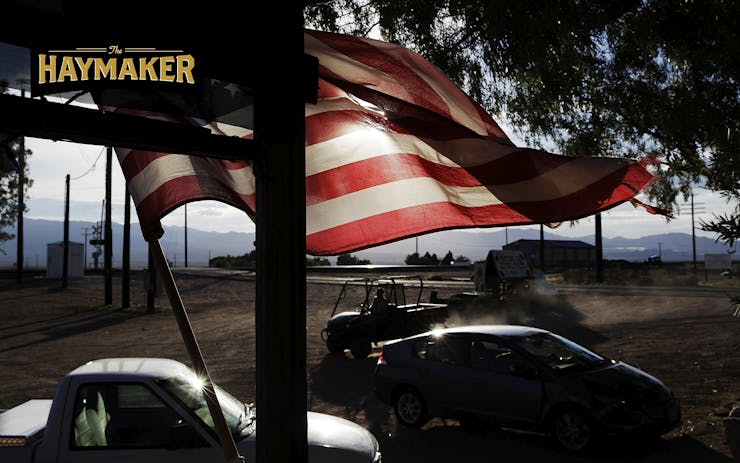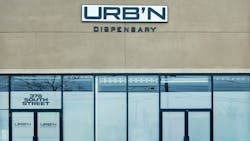‘The Haymaker is Leafly Deputy Editor Bruce Barcott’s opinion column on cannabis politics and culture.
The dream is dead. The World-Famous Nipton Ghost Town Cannabis Resort, heralded and hyped by the world’s media just seven months ago, has been sold to a penny-stock oil and gas company.
You remember Nipton, right?
A ghost town fairy tale bites the dust. Who could've seen that coming? Everybody, pretty much.
Last August, when a sketchy penny stock company called American Green announced plans to purchase the 80-acre Mojave Desert town and turn it into a marijuana resort, the mainstream media came a-running. USA Today said the tiny town was “on way to becoming pot mecca.” The Washington Post dug its planned energy independence, while Architectural Digest lauded its “perfect environment for growing marijuana.” CNN predicted a “Pot Paradise,” and Denver Channel 7 said Nipton was “soon to be the pot capital of America.”
I could go on. Dazzled by the prospect of a wacky California pot story, editors at mainstream news outlets lapped up the Nipton hype like thirsty Shih Tzus.
We here at Leafly weren’t immune. We ran an AP story headlined “Company Plans to Turn Desert Town Into Cannabis Paradise.” Shame on us.
But a few days later, we started looking a little more closely at the deal. And the closer we looked, the fishier the whole thing smelled.
This is what we reported on August 17, 2017:
“American Green” is only the latest incarnation of this company, which was incorporated in 1998 as Ti-Mail Inc. Two years later it changed its name to Desert Winds Entertainment. Two years after that, it became SunnComm Inc. In 2002 it became SunnComm Technologies. 2004: SunnComm International. In 2007 it became The Amergence Group. Four years later it became the Altitude Organic Corp. In 2012, it changed into the Tranzbyte Corp. Two years later it became American Green Inc.”
With Nipton, though, the company finally gained some traction. In the days that followed the purchase announcement, American Green’s stock price tripled in value. It spiked from $0.0011 to $0.0037—yes, that’s eleven one-hundredths of a penny—before settling back to $0.0023.
Somebody made money on the hype.
Struggled To Raise the Money
Now comes the all-too-expected third act. The Associated Press reported yesterday: “Cannabis technology company American Green Inc., which bought Nipton for $5 million last year, has sold it to another company in a deal worth $7.7 million, acknowledging that it struggled to raise the money needed to remake the old desert mining town on the Nevada border about 60 miles south of Las Vegas into a pot paradise.”
Shop highly rated dispensaries near you
Showing you dispensaries nearTo give credit where it’s due, Leafly financial columnist Alan Brochstein broke the same news on his New Cannabis Ventures site nearly two weeks ago.
Brochstein has long been wary of American Green and its Weed World dream. “Investors should be extremely cautious,” he wrote back in August, “as the company, which doesn’t file with the SEC, doesn’t have the financial capacity to buy the town or develop the project.”
American Green “purchased” Nipton with only $100,000 down, and never had a realistic shot at scraping together the rest of the $5 million total.
Delta Who Now?
The new owner of Nipton is Delta International Oil & Gas, a Colorado-based penny stock group that plans to…well, nobody’s quite sure what their plans are. Delta is in the business of turning around underperforming oilfields.
'It is very unlikely that the shares the company is getting from Delta for the Nipton acquisition are worth anything at all.'
According to its latest SEC filing, Delta had about $519,000 in assets, $523,000 in liabilities, and brought in all of $245,000 in sales through the first nine months of 2017. In October the company cancelled all management salaries, and reported an accumulated debt of $7.2 million, which, Delta reported, “raises substantial doubt about the Company’s ability to continue as a going concern.”
And yet in its announcement of the sale, American Green claimed that it had transferred its Nipton holdings to Delta “for consideration totaling more than $7.73 million.” In theory, American Green realized a $2.73 million profit on its seven-month investment in Nipton—but if you believe that, I’ve got some Tranzbyte stock to sell you.
“Management at American Green may cheer the paper profit generated by this penny stock charade,” Alan Brochstein observed, “but it is very unlikely that the shares the company is getting from Delta are worth anything at all.”
David Gwyther, the American Green chairman whose game includes no shame, last week continued to hustle his audience toward the Great Egress: “American Green can now expend less of its energy on capital raising,” he said in the company’s news release, “and focus on implementing the revenue-generating components of Nipton, and its other investments, along with many new, and exciting projects on the horizon.”
The New Meaning of Nipton
Don’t waste your tears on penny stock investors who lost a buck on this deal. (And if they made a buck, heed the advice of Trump’s national security advisors: DO NOT CONGRATULATE.) The real losers in this whole thing are invisible: The true cannabis entrepreneurs, with real products, who now will find it a little bit tougher to find investors and build the next great American companies.
The Nipton story feeds the perception that the cannabis space is full of oily hucksters. God knows they’re out there—here at Leafly News our inboxes are jammed with dubious claims and sketchy products every day. But there are also plenty of legit companies built for the long haul—The Goodship, Korova, FireFly, Pax, Select, Sensi, Smoke Cartel, Flow Kana—and a generation of Cannabis 2.0 companies just getting started in somebody’s kitchen, garage, or in incubators like Gateway or The Hood.
Ultimately, the Nipton fiasco may prove to be a cautionary tale for both investors and the emerging cannabis press. Instead of hyping every novelty “cannabis-and” idea, we need to stop and ask: Is this real?
The answer may come in the form of a neologism that signifies an empty cannabis industry promise:
“No, it’s just another Nipton.”





